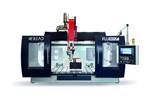Airtech to integrate composite materials into Adaxis 3D printing software
Unification of technical competencies on a single platform facilitates the precise control of the AdaOne pellet-based 3D printing technology, optimizing materials performance and quality of printed parts for end-users.
Airtech Advanced Materials Group (Huntington Beach, Calif., U.S.) and robotics software company Adaxis (Bayonne, France) have formed a strategic collaboration to integrate Airtech’s advanced composite materials and expertise into Adaxis’ AdaOne software platform. This partnership aims to provide turnkey programming solutions for end users, leveraging the full potential of 3D printing technologies.
Key features that the collaboration will address include:
Turnkey programming solutions: The integration of Airtech materials into AdaOne will enable seamless programming for end users. This solution aims to simplify the process of setting up and using Airtech materials in 3D printing applications. Material profiles will be automatically implemented, setting the correct maximum and minimum layer heights, layer times and other critical parameters, ensuring optimal results with minimal setup time.
Material-specific enhancements: AdaOne will include material-specific algorithms and settings to ensure that Airtech’s composite materials are used to their fullest potential. These enhancements will focus on improving the mechanical properties, surface finish and dimensional accuracy of printed parts.
Additionally, the stiffener geometry will be adapted using a genetic optimization algorithm to ensure that each layer has the same layer time, enhancing the structural integrity and uniformity of printed parts.
Quality improvement: Leveraging Airtech’s expertise in composite tooling and vacuum bagging materials, the collaboration will introduce new quality control features within AdaOne. These features will monitor and adjust printing parameters in real time to ensure consistent quality throughout the printing process. Furthermore, AdaOne will automatically set the maximum and minimum layer height for planar along curve and sweep operations, optimizing the layer deposition for improved print quality and material efficiency.
Expanded 3D printing capabilities: The collaboration aims to fully exploit the capabilities of 3D printing by integrating Airtech’s high-performance materials. This will enable the production of complex geometries and large-scale components that are difficult or impossible to achieve with traditional manufacturing methods.
User-friendly interface: Adaxis’ AdaOne platform is said to be known for its intuitive and powerful interface. It will provide users with an easy-to-use
solution for programming and executing 3D printing projects with advanced composite materials.
Existing partners of both companies are expected to benefit from these developments, including technology suppliers such as Belotti, Caracol AM, CEAD, Dyze Design, Massive Dimension and Rev3rd, as well as end-users like AES, Haddy and Uni Maine.
“Our collaboration with Adaxis represents a step forward in additive manufacturing,” says Gregory Haye, director of additive manufacturing at Airtech Advanced Materials Group. “Integrating our advanced materials into the AdaOne platform, we are providing users with the tools they need to achieve superior quality and performance in their 3D printed parts.”
Related Content
-
A new era for ceramic matrix composites
CMC is expanding, with new fiber production in Europe, faster processes and higher temperature materials enabling applications for industry, hypersonics and New Space.
-
Carbon fiber, bionic design achieve peak performance in race-ready production vehicle
Porsche worked with Action Composites to design and manufacture an innovative carbon fiber safety cage option to lightweight one of its series race vehicles, built in a one-shot compression molding process.
-
Plant tour: Albany Engineered Composites, Rochester, N.H., U.S.
Efficient, high-quality, well-controlled composites manufacturing at volume is the mantra for this 3D weaving specialist.

















